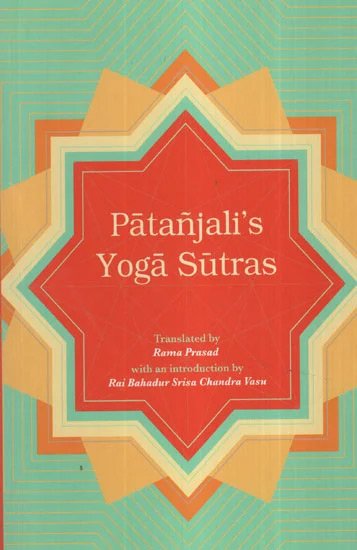Yoga-sutras (with Vyasa and Vachaspati Mishra)
by Rama Prasada | 1924 | 154,800 words | ISBN-10: 9381406863 | ISBN-13: 9789381406861
The Yoga-Sutra 2.9, English translation with Commentaries. The Yoga Sutras are an ancient collection of Sanskrit texts dating from 500 BCE dealing with Yoga and Meditation in four books. It deals with topics such as Samadhi (meditative absorption), Sadhana (Yoga practice), Vibhuti (powers or Siddhis), Kaivaly (isolation) and Moksha (liberation).
Sūtra 2.9
Sanskrit text, Unicode transliteration and English translation of Sūtra 2.9:
स्वरसवाही विदुषोऽपि तथा रूढोऽभिनिवेशः ॥ २.९ ॥
svarasavāhī viduṣo'pi tathā rūḍho'bhiniveśaḥ || 2.9 ||
sva-rasa—by its own potency. vāhī—flowing, viduṣaḥ—in the wise. api—even, tathā—all the same, rūḍhaḥ—established, abhiniveśaḥ—love of life.
9. Flowing on by its own potency, established all the.same even in the wise, is Love of Life.—60.
The Sankhya-pravachana commentary of Vyasa
[English translation of the 7th century commentary by Vyāsa called the Sāṅkhya-pravacana, Vyāsabhāṣya or Yogabhāṣya]
[Sanskrit text for commentary available]
Tn all living beings exists the self-benediction, ‘would that I were never to cease. May I live on.’ And this self-benediction cannot exist in him who has not experienced the nature of death. And by this the experience of a former life is inferred. This is the affliction of Love of Life, which flows by its own potency.
That even a worm just born should know the fear of death, which is the same as the knowledge of annihilation, and that this fear cannot be explained by perceptive, verbal and inferential knowledge, leads to the inference that the pain of death has been experienced in a former life. And as this affliction is found existing in the extremely ignorant, so also is it established even in the wise, who have come to know both the starting and finishing ends of life. Why? The residual potency having been brought about by an experience of the pain of death, is necessarily common to both of them, the knowing and the ignorant.—60.
The Gloss of Vachaspati Mishra
[English translation of the 9th century Tattvavaiśāradī by Vācaspatimiśra]
Explains the meaning of the words, Love of Life (abhiniveśa). ‘In all living beings, &c.’ This self-benediction, this desire with reference to one’s self is constant. ‘Would that I were never to cease to be,’ i.e., May I never become extinct. May I live on, i.e.,
May I retain life.’ And this self-benediction, this love of life, this fear of death is not possible in a living being who has not experienced his liabilities to die. The unbeliever denies the fact of a previous life. The author, therefore, takes the opportunity to refute him ‘And by this the experience of a former life, &c.’ The experience of a former life is inferred, because the present body is being maintained. Birth means the coming into relationship with the experiences of a body, senses and mind which are new and which are specialized by a new coming together. Its experience means coming into contact therewith. That is inferred, How? Explains ‘This the love of life, &c.’ Without completing the sentence says that is is an affliction: ‘this affliction.’ It is this love of life which through evil deeds, &c., afflicts, i.e., gives pain to living beings. It is, therefore, called an affliction. Finishes the sentence, ‘which flows on, &c.’
The meaning is that it flows on by its own potency brought about by habituation, and is not external. Gives the reason, why it is not external even in the case of a worm which is just born, is full of pain and is of a very low type of intelligence. ‘That even a worm just born, &c.’ ‘Can not be experienced’ means cannot be caused. This is the meaning. A child just born begins to shake when he sees a death-dealing object. The knowledge of death is inferred by his peculiar trembling. It is thereby found that he is afraid. Fear is seen as being caused by pain or the cause of pain. He has not experienced death in this life. Neither has inferred or heard about it. The knowledge of the peculiar pain and of the particular cause thereof which is causing pain at any moment is therefore a previous possession of his. All other means of the knowledge being excluded, the only one that remains by the canon of residues, is memory. And this memory cannot exist without the residual potency of a former experience. And inasmuch as there is no experience in this birth, the experience of a former birth only remains as the cause proved to exist by the canon of residues. For this reason there was certainly contact with a former birth. The word ‘even’ necessitates a contact with something, Bence completes the meaning of the sentence by saying, ‘And as, &c.‘
The extremely ignorant are those whose intelligence is very low. Explains wisdom ‘Who have come to know both the starting and finishing ends of life.’ The end means the point. The world of experience is the first of the life of the Puruṣa. The final one is absolute freedom (kaivalya). The wise are so called because they have come to know of this by verbal and inferential knowledge.
The fear of death is then established in the worm on the one side and in the wise man on the other. The question arises that although the fear of death might well exist in an ignorant man, it is not proper that it should exist in the wise, inasmuch as in the latter’s case it must have been uprooted by knowledge. And if it be said that it is not uprooted in this case, then the highest manifestation of the quality of essentiality (sattva) must be absent from him. With this object puts the question, ‘Why?’ Gives the answer. ‘This residual potency, &c.... is common, &c.’
The meaning is that the wise man is not he who has reached the state of the Cognitive trance, but only he who can discriminate by inference and verbal knowledge.—9.
